Revolutions and Revelations
by Shalen Lowell
5 November 1767
“If it weren’t for that snotty kid with a fever, I would have gotten out before that damn sun set,” muttered Dr. Alex Hitch as he paved his way through the dark and smoky streets of Haymarket, streaked with the rotten detritus of yesterday’s fruit vendors. “These streets are creepier than the cellars of that old meeting house,” he concluded, as if not talking to himself but rather a medical colleague over some finely steeped Harbor tea. The cacophony of cobblestones assaulted Hitch as he paced the market block and rounded up to old Faneuil Hall, the cellar of which he spent many a late night, after his last house call, poring over archetypal witch trial documents, many of which were forged, copied accounts, but hey, you get what you get.
Hitch had been right smack in the middle of the transcription of one Mary Bradbury’s records and testimonies before Judge Hathorne in the Court of Salem, one of the more enticing case files. Poor Mary claimed to live out with due diligence the words of the Gospel, obeyed the ministry, and preached against heathenry. Even pledging obedience to the patriarchy isn’t enough to exonerate oneself these days. Not as juicy as Bridget Bishop’s testimonies, but a rich text nonetheless. Never in his 25 years did Hitch imagine fulfilling the dull and dirty work of his father, also a man with a medical profession, and with a particularly sterile sense of humor.
Hitch tugged at his graying overcoat and its frayed collar, stalking closer to the string of boozie Irish pubs lining the walk. “Better stick close to the shadows. Much better to avoid the horse shit.” Not bothering to glance in his periphery, Hitch swept across Treaumont and Common Streets and took the frigid stone steps of the Hall two at a time, managing not to trip until the top one this time. Hitch careened over and into the side of the hall, blackened by the half crescent moon on the adjacent side of the sky.
“What the hell was that?” Hitch reared back on his feet and smoothed out his black hair over his widow’s peak as he looked to see whether the folly was his or the steps, which seem to be in continual disrepair. “Revolutionaries these days,” shrugged Hitch as spun around and saw—
“Is that a body?”
Hitch was thoroughly unsurprised at the lump of flesh strewn across the stairs. “Did I just trip over that…?” Hitch swung around, looking around for another human with which to validate the strange occurrence and realized at that moment that a body lying out in the night, unclaimed, probably wasn’t a normal occurrence. Not one to be deterred by decaying bodies, Hitch knelt down to identify it. Despite his medical professionalism Hitch almost gagged when he saw the face of Henry Cabot, rector of the North Church, peering up at him with hollow eyes and a mouth occupied with hundreds of maggots, slowly but surely inching their way out of Cabot’s extremities. Hitch gently prodded Cabot. Other than the gross maggots, he could identify no other physical evidence to diagnose this odd situation. Hitch found, after plugging his nose and removing Cabot’s shoes, what looked like to be the symptoms of dropsy: swollen hands, face, and feet.
In his vapid exhaustion combined with the dizzying confusion of the late hour, and also the peculiar observation that no one seemed to be walking near the Faneuil block at all, Hitch sighed a deep breath of sleepless annoyance at this new patient (of his apparently) and burst into the Hall, proclaiming to a few men crouched over sketches of town streets and battle outlines dripped with mucky wax, “We’ve got another one…”
#
Darin Flyte sat slouched against the backside of her sparsely cushioned wooden booth at the Green Dragon, one of Boston’s more dingy but homey hidey holes, the pub always playing host to a motley group of eclectic characters across the town, from politicians to the plain old town drunks. With her rump pressed firmly into the wooden frame of the booth and her shoulder slouched against Mary, one of her only longtime and dearest friends, she swore out of the grimy windows stacked with soot that she saw a crowd hustling past the pub and across the street to Faneuil.
“What do ya think they’re up to?” Mary twisted under Darin’s alcohol-weighted stupor to get a better look out the window. The crowd continued to jog past and tapered out to a slower trickle of stragglers.
Darin rolled her eyes and let her head lop back onto Mary’s shoulder. Slapping herself awake, Darin shook her head in an attempt to wake from her self-induced stupor. “Meh the usual … Probably a flock of late night worshipers groveling at the heels of Henry Cabot to “repent” their desperately kept hidden sins.”
As Darin raised her eyes to the door, she saw Dr. Alex Hitch storm through, dragging in some of the brief drizzle, which deposited in puddles around his well-worn boots.
Though not one to command the center of any sort of attention, Hitch blurted out, “There’s been a MURDER!”
“Wait what?” Felix Amory, owner of the pub, pitched up from his seat at the rear of the room, amid a flock of receipts. “What could you possibly be talking about? We’ve kept this town pretty clean over the past year.”
“I don’t know. I don’t yet have an answer,” Hitch admitted, placing his hat on the top of the coat rack by the rust-hinged door and stalking to a high seat by the bar, so all could hear. “But it was Cabot. Henry Cabot. I can’t believe it myself.”
“Cabot? Holy shit…We’ve got a serious one this time…” Felix said. “Although I s’pose it’s technically on your hands, you being the doctor and all. Shit.”
Hitch heard a chorus of incoherent mumbling and exasperations throughout the pub, which, when he held up his hands for a moment of silence, dulled to a sullen hush as those gathered there decided to shut up and listen.
With a heavy sigh, Hitch blew out the nervous breath he’d been holding in and said, “Don’t worry, I’m sure I’ll get to the bottom of this somehow…Since I’m the only capable medical professional. I am in need of new patients after all, and I just happened to stumble across this one.”
And before the chatter rose to a dull roar, he added into the chaos of the pub, “I haven’t had a proper chance to inspect the good Father Cabot of course, but there does seem to be something strange about his murder…Something not altogether…natural…you understand.”
A drunken and confused chorus of “Wait!” and “How so?!” erupted from the contents of the pub, affording Hitch only choppy moments in the intermediary remarks to shout, “I won’t say anything until I’ve had a closer look!”
From the corner, Darin rolled her eyes further into the back of her head in boredom and, turning as if in exposition to those around her, commented, “There is no such thing as magick.” Then she worked herself up a bit louder, standing so Hitch could hear her.
“Come on, Alex,” Darin scoffed, “You know as well as I do that all that magick stuff is bogus. This is the eighteenth century after all…”
“I didn’t say a thing about magick.”
“Well, I intimated where you were going with this…Salem’s not too far away, you know.”
Hitch shrugged and took a step back from this particular bombastic Bostonian. “Nice woman, but you never know when the temper’s going to flare,” he muttered into the sleeve of his overcoat, and then proceeded to respond with, “Ahem, actually, I prefer Hitch if you don’t mind.”
“I know you as Alex and I’ll address in kind.”
Hitch bellied up to the bar and dumped half the contents of a stout down his throat, and after whetting and clearing it, he plowed forth. “I’m just saying, didn’t look like natural causes to me. Or maybe it was meant to look that way. I don’t know. It’s late and I’m tired. Once I get Cabot back to my house, I’ll inspect him further and uhmmm…”
Sensing the loss of his argumentative momentum, Hitch mumbled and pushed his way through the crowded pub to the chilly street corner and huffed off. The passersby had by now flocked either home or sought the warm stocked fire of the Green Dragon and other such dives nearby, so not a soul heard Hitch as he exclaimed loud enough to hear, “East-coasters these days are such a disagreeable sort.”
#
Harper Ratcliffe sniffed and hocked a wad of saliva into his fist as he leaned back in his rickety wooden chair in the butt end of the pub, with a clear sense of satisfaction. There was nothing Ratcliffe enjoyed more than a friendly but heated disagreement. “Well that was fun.”
Ratcliffe tipped his head back in exasperation and proceeded to bob forward until his chair clattered back on all fours in front of his table. Ratcliffe sucked on his burnt out cigar, trying in vain to make the smoky vanilla flavor last until he could pawn another via a passerby five-finger discount.
Ratcliffe sucked and spat on his cigar, chewing the ends a bit, notebook still lying spread-eagled on the table. Harper Ratcliffe fancied himself a bit of a writer, a purely freelance amateur. He very much enjoyed, and staked a good deal of his pride on, transposing real life “characters” into his many fictive universes.
“That Darin Flyte would make a great one,” Ratcliffe thought underneath his ale-scented breath. Ratcliffe had planned to take a note or two during the encounter just witnessed with one particular Dr. Alex Hitch, but instead decided to trace his own signature with a finely-tipped pen, until the ink bled through to the other side of his loosely stitched notebook pages. His notebooks were a lot like Ratcliffe himself: well-worn, seams bursting, well-used, ragged, yellowing and dank.
“She’s quite interesting indeed.” Behind him, he pricked his ears at another of the townies gathered in this late hour, Felix, the innkeeper. Ratcliffe’s ears picked up a vague snide comment whispered from Felix’s mouth, something along the lines of “mmmghhmmmmmm…hygiene…”
Ratcliffe cleared his throat rather loudly and exclaimed in a manner more emphatic than necessary, “What was that, Amory? If you’re going to insult me, please speak louder, eh?”
Felix squinted and scoffed at Ratcliffe from a few tables over. After a brief interlude of pointless indecision, he decided to spit back with notable vehemence, “Awww fuck off, Ratcliffe. Pall around in someone else’s pub for a change, I have half a mind to revoke your room and pitch you out on the street.”
Ratcliffe spun in Felix’s direction and afforded him a seductive wink from across his table. “You mean you don’t find me charming? Come on, man. Plus, you know as well as any I need the room.” Another wink.
Felix’s face registered somewhere along the spectrum of former lovers between awe and appalling dejection. “No,” Felix said with a less than certain conviction, “As a matter of fact I don’t.”
“Well, you’re not as strapping as you were, my dear Felix Amory. And to think, if you still had held onto that boyish charm I still might want you.”
“Excuse me? Want me?”
“Yeah, but like I said, not anymore.” Ratcliffe shot yet another wink and tongue-click, followed by a soft and subtle deep-throated purr, before spinning back around to stun him, as well as silencing the rest of the bar company.
“Mmmmm yes,” hummed Darin, “Poor Alex really is going to have his hands full with all this bloody business going around.” She sipped her nightcap of brandy before continuing, “I do wonder how he’ll manage it.”
Mary frowned at her friend, fresh from the town’s streets after having finally departed the pub. In a harsher tone than she meant, Mary said, “No need to be an ass. What’s gotten into you tonight, eh?”
“Nothing. Murder and rumors of murder are so tedious.”
“You’re saying you believe it didn’t happen?”
Darin sipped, waving her free arm. “I’m just saying, where’s the proof? Where’s the body? Hitch has nothing, no proof, and he didn’t even produce Cabot’s body to corroborate his claim. I’m as dubious as anyone.”
“Okay.”
“And moreover, that nonsense about magick? There’s no such thing. And to claim a murder committed by such is ridiculous. Ludicrous, I can’t even.” Mary plopped herself down on the leather chair adjacent her friend in Darin’s sitting room. Darin kept a timeless aesthetic, the finest leather and goose down-filled furniture, though the crimson colored walls of the room often gave the impression that the walls were pressing in on oneself.
“Hitch never said anything about magick.”
“What did he say, then?” Darin gulped the remainder of her drink and half slammed the glass back onto the wooden serving table beside her.
“You know as well as I,” said Mary, with a hint of odd suspicion dripping from her words. “You were there. He said ‘may not be natural causes.’ That’s all, nothing specific about magicks.”
Darin leaned back, stretched out on her down sofa, and closed her eyes. “Yes, I suppose that is what he said. Still either way, I don’t believe it.”
“Oh come on, you came from the northern towns. You don’t even believe natural magicks and such phenomena exist? What about wiccans?”
“No!” Darin stood in a rush of fury and, gasping, tried to keep her words guarded and under control. But the wave of anger was sure and steady, and Darin’s voice level grew at a crescendo until she was yelling at Mary: “There is no such thing as magick. All that stuff, that “magick” was bullshit, nothing more than the accusatory claims of children running through the streets of this city claiming that this person or another was a witch. It was a campaign. Nothing more than the naïve mutterings of children looking to get a rise and panic out of common folk. You of all people know how I feel about this.”
Mary shrunk back in Darin’s chair and exhaled an exasperated sigh of defeat. She shut and rubbed her eyes, hoping the tiredness and pain would recede. “I know, I’m sorry. I do know. I’m just saying it’s in the realm of possibility of belief for me, still.”
“Not for me.”
“I know.”
Darin dropped back into the sofa and spread herself along its length. “It’s been a long day, Mary. Please leave me be.”
“Okay.” Mary knew there was no use arguing with Darin, stubborn and steadfast in her ways but a good and benevolent person at heart, Mary swore to it.
Darin waited until she closed the sitting room door and sat down in her guest room, picking at the silver rose locket that hung around her neck. It had been a gift from her mother before her untimely death.
“What a messy, messy affair. I wonder what can be done to ameliorate it.” The later the clock struck, the more often Darin talked to herself. Darin rubbed her eyes, rubbing over a few freckles on the bridge of her nose, and smoothed out her messy dark brown locks. As her grandfather clock struck twelve, Darin sunk into a sobering sleep, deciding how best to approach Hitch.
#
6 November 1767
“You know, maybe Hitch could use some help with this investigation after all.”
“Oh yeah?” Felix was rinsing out glasses at the bar before the dinner rush. Darin liked frequenting the Green Dragon, not for its rowdy crowds, but more for Felix as well as the intrigue. There wasn’t a Bostonian who didn’t know that if you were after secrets and information, or the transmission of either, Felix was your guy. “Help from whom?”
“Why, me of course,” Darin smiled in that sly, intelligible, and knowing manner. “I was a member of Cabot’s congregation after all, so I knew him pretty well. I could be useful to his investigation.”
“Yeah maybe. It’s just Hitch working on it so, I’m sure he would at least appreciate the help.” Felix replaced a glass on the underside of the bar and stopped mid-motion. “Wait, what about that huge stink you made the other day? This initiative seems all of a sudden.”
Darin shrugged Felix’s remark off, “Eh, I was out of line. I probably shouldn’t have shit on Hitch like that, but I can make it up to him by helping it out. Though I do sincerely doubt magick had anything to do with Cabot’s timely end.”
“Uhmmm,” Felix shot Darin a skeptically browed look from below bar level, “Don’t you mean untimely?”
Darin’s eyes widened for a fraction of a second. “Oh yeah, of course. Untimely it was at that. Anyway I think Hitch could use the help. And so I want to help.”
“Well that’s good of you, anyway. If you and Hitch can cooperate, I’m sure he’ll appreciate it.”
“Indeed,” agreed Darin. “The good doctor, like many of the authority figures of this town, could always use a bit of advising from someone else.”
“I see.”
“Plus, I have a reputation to uphold. I should not have been so foolish with him.”
Felix hummed an “mmmmm” in agreement. Though he may not come out and say it, Darin was one-hundred percent right. Not just about Hitch, though Felix thought the doctor would probably perform fine on his own. She was right about the town, their dear Boston, with its old world conservativism still imbued with older narrow-minded and patriarchal sensibilities. This town, though settled, was still explosive. “And I want to be right in the thick of all the action,” Felix mumbled under his breath, now frosty from the door opening and closing as Darin left the pub with a trail of fresh rainwater behind her.
#
The following afternoon, Hitch leaned a bit closer to Henry Cabot’s body, now stowed on the slab in Hitch’s cellar and mortuary room. Dark and dingy, like most cellars, Hitch’s had the added element of housing all his medical playthings, various metal instruments, syringes, tape and bandages, and all such things macabre that he was unfortunate enough to deal with in his daily work. Having afforded a squat house of his own right in the town, Hitch thought it most convenient to place his medical practice right in the forefront living room and cellar of his home. Though economic in decision, Hitch now resented the choice. “How horrid and gross. Why did I ever choose the medical field? So depressing and nasty, and I do so hate getting my pressed shirts dirty,” Hitch muttered to Cabot’s dead corpse. “Not like you can hear me anyway, so I may as well complain all I want.”
Hitch proceeded to peel back the thick layer of now rotted skin and fat from Cabot’s chest to his torso, then took care to break Cabot’s ribs and breastbone in the process, for further inspection of the hollow husk that was once a full-grown man. Hitch almost gagged as he remarked at the thousands of maggots feasting on Cabot’s insides. By now the swelling on his extremities had stopped, but Cabot’s hands and feet still remained inflamed and pungent.
“Mmmm but the real question is, how did he get like this?” Hitch’s monologue reverberated off the stone cold interior of his darkening cellar. Candles were interspersed on various shelves and examination tables to give light to the whole of the room. However the waning daylight did nothing to help his cause. “You, Cabot, I just talked to you the other day, and you seemed to be in perfectly good health, other than being a bit of an alcoholic, rotund, self-important bastard…I had no reason to suspect your ill health at the time…”
Hitch walked up closer to Calbot’s head, intending to poke it here and there to check for cranial inflammation. To his disgust, Hitch spotted a wad of earwax caked on the inside of an ear.
“There’s also the matter of how you got to Faneuil Hall. You may have dragged yourself there? But how, when you had no independent use of your insides and thus mobility? There’s no way this could have happened in the course of a night, nor could you have made your own way, so someone dragged you, perhaps?”
Hitch shrugged at Cabot’s corpse and proceeded. “Then there’s another question of how someone did this to you—since I doubt you would self-impregnate with maggots—where they stowed your body in the meantime—and of course, again, why…”
Hitch answered himself:
“The circumstances are indeed peculiar,” just as the doorbell rang from aboveground at his front door. Grumbling and groaning, Hitch washed himself of Cabot’s innards and mounted the cellar stairs up to his crimson-carpeted front hall. He swung open the door, only to find the person he least wanted to see and last expected to be at his home: Darin Flyte.
Not knowing what else to say, Hitch offered an, “Oh, hello Darin.”
Darin bowed her head a fraction of an inch towards the doctor and offered up the cheery greeting of, “So sorry to bother you, Hitch, I know you must be insanely busy, what with all this disturbing Cabot business…I wanted to first apologize for my behavior the other evening, and second, to propose an offer that I think you’ll find quite beneficial.”
Hitch raised a dull eyebrow and let the bags of his eyes droop to full extent, in evidence of how tired and bothered he was to be interrupted after office hours. “Ah, using my preferred ‘Hitch’ like I asked.”
“Yes. I spoke out of line the other night. I didn’t mean to offend more than usual. Too much to drink and a long day, you know?”
“Yes. That is, uhm, I mean thank you.”
“May I come in?”
“Yes, of course, forgive me.” Hitch backed from the doorframe to allow Darin to enter the house, all the rooms of which were outfitted with hardwood, and a bit creaky at that. As he closed and locked the large entryway door, Hitch continued, “So you say you have an offer for me?”
“Yes, I do,” Darin undid the buttons on her dark navy pea coat and revealed her button-up black trousers, tucked into what looked to Hitch like knee-high riding boots, complete with a loosely fitted cream-colored undershirt that billowed out at the sleeves and tied just below her neck. An awful lot like a gentleman’s clothes, Hitch thought.
“What with the impending colder seasons and all, I know you have a lot of patients on your hands—literally. You’re quite the busy man, Dr. Hitch, and I know you could use a bit of extra help, especially on this Cabot case.”
“What exactly are you proposing to me, Darin?”
“That I assist you of course, in the manner of your investigation into Cabot’s murder.”
Hitch near stumbled on the carpet, on his way to offer Darin a seat next to the hearth in his kitchen and a steaming cup of tea. “You want to help me? After that nasty show in the pub the other night, you can understand why I would be a bit skeptical, no?”
Darin shrugged her shoulders and agreed, “Of course, I know it sounds a bit odd considering the spectacle I sort of made. It may be hard to believe, but I do mean what I say. I would most definitely like to help you in your diagnosis and investigation.”
“I don’t mean to offend,” admitted Hitch, “And I appreciate the offer greatly. But how would you know so much about diagnoses and medical afflictions.”
“My mother was a healer and herbalist. She taught me a great deal.”
“Well I do hate to admit it, but I could use a second set of eyes…from anyone really. You may as well come on down.” Hitch ushered her inside his home. “I’ll get you a smock…”
#
Equipped with his new assistant, Hitch and Darin were bent over Cabot, both dawned with fresh, white smocks and peering into Cabot’s decaying innards. Thanks to Hitch, most of the maggots had been carved out of Cabot’s body, but an errant bug or two remained.
“I would rather have you inspect the body on your own and see what you find for yourself, but for the sake of expediency in the waning daylight, I want to tell you a few of my vague theories.”
Darin, thinking she would rather have a first look herself, stifled an argument. “Okay, give it to me, doctor.”
Hitch sucked in a deep breath and fired off his observations: “So, from what I have here, which thanks to the accelerated rate of decay as well as the host of feasting bugs is not much, I’ve noticed an oddity or two. I managed to swab a small piece of Cabot’s stomach lining, as well as his intestinal tract and found the remains of some drink very high in alcoholic content.”
“What like beer or ale or mead? Maybe the rector liked to drink or something.”
Hitch waggled a finger and continued. “Hah, no way, those drinks are child’s play compared to what we have here. I’m talking a drink consisting of over 50 percent alcohol.”
“Such as?”
Hitch continued, “Well it could be any number of things, but I’ve heard whisperings of a spirit called absinthe…It’s made by the Swiss, very potent, and can cause hallucination, delirium, and in excess amounts, death. It is a botanical spirit, made with several types of herbs including fennel and wormwood.”
Darin crinkled her brow and asked, “Well from who, and when, did he procure it? I’ve never seen nor heard of anything like this, so it must be rare.”
“That’s the thing, I don’t think he drank anything of the sort.”
“Okay, well then how did this happen? He clearly had to have gotten some, if it was in his system.”
Hitch corrected Darin with further insistence, as he built up some confidence in his argument. “There’s no doubt there are traces of the ingredients of absinthe, but I’m not sure the good Cabot here drank absinthe.”
“So you’re suggesting that whatever the cause of his death, it was made to look like he ingested the drink?”
“Exactly!” Hitch scooted over to a side table, on which rested notebook with some messy, scrawling cursive inside.
Darin inched forward, near plunging her face into the belly of Cabot’s formerly infested gut. “Maybe it was one of those ingredients, made to look like the drink itself that killed him. In that case, it was a someone who killed him.”
Hitch hummed in agreement, “Mmmmm mhmmm…”
Darin continued, “And if I were to guess, the fatal ingredient, or one of the fatal ingredients, would be wormwood.”
“I thought as much, too. But why wormwood?”
“My mother told me wormwood, though used as an old and archaic remedy for removing anger or protecting one from curses, cannot be directly ingested. It’s poisonous.”
“Yes! Yes!” Hitch had to admit though frustrating she could be, Darin was intelligent, and her mother taught her well. “I’m glad I’m not going crazy down here, as one is prone to do in the dark with no one but a corpse and one’s own illegible notes to keep company.”
Darin raised herself and finally took a step back from the body. The rank smell of decaying organs and flesh was finally getting to her, so she plugged her nose as she asked, “Wait. Hitch, how do you know so much about herbal remedies and botanical properties?”
Hitch raised an index finger once again, pretending he was delivering a lecture to a hall full of eager students. Seemed he did like attention after all. “I confess my profession does not do much to satisfy me. While carrying on my father’s tradition of the medical field after his death, and while my job does afford a stable income, I get bored easily. I spend my free time, what little I have of it, in enjoyment of poring over historical documents in the cellar of Faneuil Hall.”
“And they just happened to have a fully stocked “botanical herbs” section?”
Hitch frowned. “Well, no. But there are many documents copied from their originals sent from the north shore, detailing the witch hunts and trials in this area. But a fair number of the sources I’ve poked through recount the reasons for accusing one woman or another of being a witch, and many mention wiccans and herbalists who were apt in healing with certain kinds of botanicals.”
“Hmmm yeah, I could see where you would get that sense,” Darin said in mock agreement, her back tensed. “So…this evidence of wormwood…that is why you think Cabot’s death wasn’t an accident? That someone forced it upon him?”
“Maybe…” Hitch trailed off. “But I think it’s more than simply just suspecting wiccan activity. I think the wormwood was used as a cover, either to poison Cabot initially or deflect suspicion from the real crime: the swift, subtle, and rapidly induced decay of his innards.”
Darin rolled her eyes from the corner of the room, propping herself on the edge of another wooden table. “So you think, just because you cannot fully explain the reason for his death that the cause was, what? Magick?”
Hitch removed a glove and scratched the back of his neck in an absent and anxious manner. “I know it sounds suspect, or maybe too far a stretch, but I have to explore every option, you see.”
“I see,” Darin mused as she unfolded her arms and walked back to Hitch’s side. “I really don’t think it’s any type of magick though. Magick doesn’t exist.”
Hitch shrugged. “Like I said, I know it sounds crazy.”
Darin puffed out an annoyed breath and resigned. “Well if you want to keep on believing, I’m sure as hell not going to be the one to stop you from your own delusions.”
“At any rate, I should probably call someone else to come help me with this case. I mean, between you and I, I know we can make progress, but it doesn’t hurt to have someone else on the force? I do have a friend, Henry, who is an officer of the town of Lowell, and he moonlights as a P.I of sorts. May see if he can help us for a bit.”
“Good idea,” Darin resigned again.
Hitch’s eyes flitted from Cabot to the small cellar windows, to Darin, noting that the room was almost devoid of light save for the ten or so flickering candles still interspersed around the room. He sighed, “Anyway, I’ve taken up too much of your good time.”
Darin rubbed her eyes and admitted, “Yes, it probably is time for me to be getting home. Thank you for having me, Hitch. Please let me know if there is any way I can help further.” She untied the white smock from her waist, affording a small smirk. “Though I hope for the sake of your argument and reputation you’re not too invested on this theory reliant upon ‘magick.’”
“Well, we shall see where the evidence leads me, shan’t we?”
“I think we shall.”
As Hitch leaned in a bit closer, squinting at Cabot despite the obvious lack of daylight, Darin motioned toward the door. “I had better take my leave.”
“Ah, yes, of course.” Hitch answered in an absentminded manner as he kept one eye on Darin and another on the corpse still on his dead table. “I’ve kept you too long, please, I’ll walk you out. Thank you again for the help.”
As Hitch and Darin ascended the steps from his cellar, and Darin assumed her coat, she mentioned, “I hope we’ll do this again soon?”
“You don’t mind the trouble?”
Darin scoffed and rolled her eyes. “Please, Hitch, I have more time than I know what to do with. And it’s not that I think you’re incompetent or anything. But I do very much enjoy your company.”
Hitch dealt her a dead-pan stare, thankful but surprised at the odd offer.
“As long as you don’t mind?”
“Oh no! Of course not! Please, I welcome your assistance.” Hitch shook himself of the daze, just in time to hear Darin say, “Well good! I shall see you soon then!” and made her way out into the icy Boston night.
Hitch shut the door on Darin. Just as she hopped down his stoop and headed towards Newbury Street, she noticed an irregularity in the shadows cast by the homes across the street from Hitch’s. She recognized the dirty, plaid-patched pants, worn and frayed wool jacket, and what remained of a derby hat perhaps, from the pub the other night. She had picked him out smirking and stinking at the back of the pub.
“Ratcliffe, what do you want?”
Ratcliffe slunk out into the faint moonlight, now replacing the orange, fiery sunset with its lackadaisical glow. Darin saw him shove something—a notebook maybe?—into the pocket of his coat as he jogged across the way over to her. “Oh, you know, just a stroll in the moonlight.” His attempted smile looked more like a snarl to Darin.
“But it’s not even dark yet.”
“Getting an early start. Little do some of the people here realize, much happens in this city when the lights go out.”
“Mhmmm I bet.”
“So,” Ratcliffe continued, “What were you and, ah, Mr…Hitch was it?”
“Yes?”
“What were you and Hitch doing together so late in the evening? After office hours, might I add.”
Darin’s eyes widened in disgust and she spat, “Are you intimating that I’m having an affair? Well if that’s what you think, you can stuff it.”
“Is that so?” Ratcliffe’s nasty grin widened.
“Yes, that is so.” Darin plowed on. “First off, it’s none of your business what I do with my free time. Second, Hitch is a respectable physician, and a friend. And I am a respectable woman.”
“Didn’t seem like you two were, how should I say, too chummy the other night when you made your scene after Cabot’s murder.”
“We have since resolved our issues.” Darin drew her coat tighter and pushed past Ratcliffe back down the street, shouting behind her, “Now if you don’t mind, I need to be going back home. Good NIGHT.”
Ratcliffe chuckled as Darin made her way in the direction of her home. Ensuring she was out of earshot, Ratcliffe scribbled two words in his notebook (“temper temper”), and thought aloud: “I wonder what this town would think of ‘Darin, the model, upright landowner’s wife’,” sarcasm dripping from his mocking tone, “when they learn about these trysts with Hitch, and her clearly unresolved anger issues … hmmm … I should hate for her reputation to suffer for it.”
#
“Where were you all day?” Arthur Flyte asked Darin, as he plopped down at their intimate dining table. The Flytes’ dining room was much like the rest of the rooms in their quaint, but certainly rich house on the outskirts of the Common: decadent but just so in a tasteful manner, with a dash of gold in their curtains and other decor. These private residences on Newbury were of the clapboard colonial type, featuring thick black shutters on smooth, greased hinges, and stately without being too lavish. This room, unlike that of the sitting room in which Darin spent most of her nights reading and entertaining Mary, had rich, cobalt colored walls and artwork from local craftsmen. Many such paintings depicted a vast jungle, with reddened horizons and sprinkled with sailing fleets here and there: the New World.
“I was just out and about, as I am most days,” Darin offered. “You know I have the time.” At that moment, Bartholt, a butler, serviceman, and valet to the Flytes entered from the two way, swinging door that led to the kitchen just beyond, and delivered their roast pheasant dinner, complete with bountiful harvest vegetables which were imported from Arthur’s land west of the city, and a fine syrah red wine. Darin offered a smile and she placed a silk napkin on her lap and cut into their meal.
“I know you do,” Arthur spoke through a mouthful, forcing Darin to wince at the sound of his talking and chewing. “You’re lucky at that, to have so much time, being a landowner’s wife and all. The investment I’ve made in some of the farms out west have provided well for us, have they not?”
“I cannot disagree with that.” Darin scoffed in her head at the improbability of herself owning land. You’d think in the process of colonizing a new world, they’d at least think to restructure the social systems, Darin thought to herself. Even if Arthur could, she wasn’t much sure of his willingness to cut her in on the “family business”. Arthur wasn’t an unbearable spouse; in fact he could be quite handsome with his milk chocolate eyes and dirty blond hair, bleached by the sun in his early days of boyhood and undercut on the bottom half of his head to reveal a natural brunette. He cleaned up rather nice, she thought. But as with any man, she was reluctant to bear him children, despite their marriage of two years. Darin decided to throw him a bone. “I was helping out Hitch today, in fact. He seems to require a certain amount of my expertise, and since, as you yourself say, I have the time, I figured I would lend him my assistance.”
“You’re helping him with this whole…Cabot affair, panic about which is spreading around these streets like wildfire?” Arthur looked up with a glance of brief skepticism. “He’s a medical professional, he can’t handle this himself?”
“It seems not.”
“Hmmm very well then. You know you don’t need my approval.”
“I certainly don’t.” To lighten her remark, Darin once again gave her husband a reassuring and genuine smile, with a hint of devilry contained therein.
“Will you be seeing Mary tonight?”
Darin had no clue if her husband thought anything suspect of her friendship with Mary, considering the frequency of the girl’s attendance at their dinners and the late hour she left their residence most nights of the week. She didn’t really care either. Darin suspected Arthur was caught in his own elicit affairs, too.
“No, I don’t think so. I’m feeling rather exhausted tonight.”
At the conclusion of their meal, Darin rose from the table and paused briefly before padding upstairs to her sitting room. She walked to Arthur, planting on him a substantial kiss, and said, “I grow weary, and I must away to bed. Goodnight, my dear.” And thus she made her way up to her room for a usual drink.
#
9 November 1767
Hitch’s ears pricked up as he heard the three knocks on his door, signaling Darin’s arrival. Popping his Yorkshire pudding from its cooking tin on the fireplace and placing it with gentle hands next to the cooling lamb roast on his mahogany counter, his boots thumped along the hallway and he made his way out to greet her. He remembered to smile, something he did not do very often, though he was in a pleasant mood, having the opportunity to entertain a rare dinner guest. He was happy to have some company and grateful for Darin’s continued assistance with this whole troublesome Cabot case.
With a bit more gusto than his usual expressions afforded, Hitch opened the door and said, “Hello Darin!” Hitch had grown to appreciate Darin’s refined and sophisticated sensibilities. Though at moments uncouth and raucous, she did offer terribly good dinner company. “Welcome!”
“Hitch, thank you,” Darin said as she stepped out of the nippy air. Her eyes looked crinkled and saggy at the edges, as if she had just woken from a long nap or managed to survive the day with a minimal night’s sleep. “I do so appreciate your company this evening.”
“The pleasure’s all mine.”
Darin hoisted the jingling contents of the cloth bag she’d been carrying, and placed it on the hall floor as she removed her jacket. “I hope you don’t mind, but since you were so kind to provide the food, I would supply the drink for tonight.” Darin winked and laughed, “You do know I love a good drink.”
Hitch perked at the word “drink” and said, “Ah, wonderful. What are we having, may I ask?”
“It’s a surprise, you’ll see!”
Hitch vacated the kitchen, accompanied by the roast and pudding, placing them on his dining table just so.
“I’m starved for good company these days,” Hitch admitted with his own little embarrassed shrug, before he realized Darin couldn’t see him from the kitchen, from which he heard the audible clinking of glassware.
Darin chuckled a bit from the nearby kitchen and added, “Well it’s a good thing we’re about to sit down for dinner right?” Darin stepped into the room bearing a curious looking beverage on a bronze tray. Spying the roast, Darin sighed. “Ahh I wish you had let me know what meat you were preparing. This drink goes particularly well with fish. Alas, we shall make due.”
Darin delivered two pint glasses of sparkling, spiced amber liquid to herself and Hitch. The glasses each contained a full pint of the liquid, a warm amber hue, rimmed with a sliced lime and a thin line of sugar. Only then did she notice Hitch’s table setting. “Are those bayberry candles?”
“Why yes, they are. How did you know?”
“Bayberries are a popular source for candle wax. Expensive though, and not very sustainable.”
“True, all the more luxurious though. Even though it takes 15 pounds of berries to yield one candle.”
Darin rolled her eyes. “They’re better off used for their medicinal purposes, such as fits and fevers.”
“I see.”
“I do love your table presentation, though.” Hitch’s table boasted extensive amounts of artisanal fruits, golden, green, and macintosh apples and red grapes, arranged in silver fruit bowls with grape vines wrapped around towering candleholders, the candles themselves made of bayberries. In the direct center of the long, rectangular table, at which a chair was placed at each end, was a pheasant, also on a silver platter. Hitch preferred to spare no extravagance when entertaining dinner guests.
“Thank you. I do pride myself on appearance.” Hitch sipped his drink, slurping a bit of the drink into the back of his mouth. “This drink is delicious, what is it?”
“Do you know poison sumac?”
Hitch gagged and spat the drink out onto his precious table décor, near spraying Darin in the face. But she was too busy laughing doubled-over, and then straightening to resume her usual smirk, her mouth tipped up in a knowing smile.
Darin added, “Hah yeah well, that’s not it though.”
Hitch’s eyes near popped out of his head, trying to register that he had almost been poisoned. Or had he? “What?”
“Don’t worry, there’s no poison sumac in that drink, “Darin laughed. “I was just playing with you.”
Hitch shot Darin a most unamused, low-brow glare as he wiped his mouth and his place setting of the cocktail detritus. “Okay…So what exactly is in this?”
“No need to worry,” Darin reassured the good doctor, “it’s non poisonous sumac of course.”
“Why in the name of God do you make drinks with sumac anyway?”
Darin took a harmless and generous gulp from her glass. “Like I said, old family recipe passed down from my mother.”
Hitch took another tentative sip of his drink and admitted, “You have a weird, sick sense of humor.”
Darin smiled, “And I take pride in that…So do you still plan on inviting your friend, whatshisname, to the town to help our investigation?”
“His name’s Tudor, Henry Tudor. And yes, I do. I’m thinking he can ask around for Cabot’s usual whereabouts, friends, any enemies he may have had. Though I don’t know why he would have any enemies.”
Darin smirked, ready to jump at the mention of “Tudor.” But as she opened her mouth, Hitch added, “Yes, I do realize the peculiarity of his name…Tudor, as in Kings Henry VII and VIII of England…”
Darin added, “Maybe he can keep an eye on that slimy Ratcliffe, too. I’m sure he’ll be sneaking around, poking his nose into our business, or your home, where it doesn’t belong.”
“Mmm good point. That, too.”
She slurped at her drink once again and cast her probing eyes across the table, in Hitch’s direction. “So tell me Hitch.”
“Yes?”
“Why do you keep to yourself so much? When I see you around town, it’s only ever you walking between appointments, and I don’t see you taking company with very many people. If any at all. Why is that?”
Hitch lowered his gaze once again. “Why do you want to know?”
“Oh, no reason in specific,” she said. “Just wondering was all.”
“Well if you must know,” Hitch offered, “I came here, to Boston, when I was just a young lad. I was under my father’s tutelage for most of his remaining years, until he died. Then, with no other viable choices before me, I look up his profession and that’s been that. All work, and not much opportunity to make friends.”
“Ah I see … I’m sorry … You know, and I don’t say this with a light heart, I can be your friend, Hitch.”
Hitch’s face reddened and he stuttered a bit in surprise of Darin’s forward statement. He coughed a bit to clear his throat before saying with a genuine, wide smile, “Yes, I would very much like that, Darin Flyte.”
#
Darin collapsed in her posh sitting room after hearing the door’s lock click in its place. Her eyes were squinted and pained in the dimmed, candlelit room. “Why do my eyes hurt so damn bad?” She rubbed her brow in frustration. “Maybe all the actual intellectually challenging conversation got to me more than I thought?” Darin chuckled.
Despite being at the peak of her contentment as of late, having found a new and decent friend, she was drained. Darin often felt that at the moment she was closest to sustaining a significant connection with another person, she felt most like retreating. Friendship, love, acquaintance, Darin realized, while wonderful, was always fleeting. No person, feeling, object, nothing was permanent, such affection including. This sensation was an odd and uncanny one, one Darin had fostered in her short life from countless flings of trust and betrayal.
Darin was both unsurprised yet shocked when she found herself thinking of Hitch, and that if she were to lose him, she wouldn’t mourn terribly. “Life’s just a series of expectations and eventual disappointments. Sure it’s great now, but what’s stopping something horrid from happening?”
Oh hell… Darin thought, as she heard a weak knock on her door. She slouched over anyway and fumbled with the door knob, revealing Mary standing alone in the shadowy hallway beyond the threshold. Darin’s face fell in exhaustion, and she swore she could feel the bags under her eyes in that instant.
“Arthur let me in again.” Mary stepped through and into the room, a bit breezier than usual, or maybe that was just the late autumn chill Darin felt on Mary’s coat. “I thought it best just to come up.” Darin nodded as Mary removed her scratchy wool pea coat and plopped down on the plush sofa.
“I’ll get you a drink.” Darin opened a wooden chest adjacent the door to reveal a set of fine china, glassware, and bottles upon bottles of wine and cider, saved for private entertaining.
Darin offered Mary the glass of red wine and sat gingerly next to her, careful not to deflate the cushions, nor rock Mary too much in her spot. Darin placed a cautious hand on Mary’s thigh and squeezed it in reassurance.
“Mary, I’m going to be completely transparent with you for a moment.”
“Of course, my dear,” Mary said, as she planted a firm kiss on Darin’s salty forehead.
Darin sighed. “You know that moment when you’re sharing an absolute, wonderful, intimate moment with someone, timeless it almost seems. Yet despite this person’s physical closeness, their body pressed against yours in a hug or an embrace or a kiss, you can already feel them retreating. They retreat, you feel their inertia drawing away from yours, leaving you alone.”
Mary wrapped her arm around Darin, cushioning her as Darin’s dead eyes drifted up to hers. “Darin, what brought this on?”
“I have this distinct and repugnant sense that things will soon be changing in ways that I cannot begin to realize.”
#
11 November 1767
Darin was hunched with her back and wool coat collar against the wind to fight off the brisk air. She had just arrived at Hitch’s house after a short walk from hers, when she heard mumbling in Hitch’s cellar. Darin decided to forego her usual politeness and let herself in.
Darin quickly wiped her boots on Hitch’s front rug, slouched off her jacket, and proceeded to tromp down to the cellar. Before her stomping presence could interrupt the conversation between Hitch and his supposed guest, Darin caught the words “His Majesty” and “undercover” in the string of conversation. She almost stopped in her tracks, mulling momentarily over Hitch’s political leanings. No bother, she thought. I’ll inquire later.
Reaching the end of the stairs, there Darin found Hitch’s table filled with a medical chart on which was drawn the outline of a body, appended with the notes of Cabot’s condition, the swelling on his extremities, and a list of potent alcohols; a diagram of the Boston roads surrounding the common, pricked with labels like “North Church” and “Faneuil” as the streets stretched out to the harbor; and the beginnings of a suspect list, on which was drawn a huge question mark. These papers now replaced Cabot’s own dead body. She also found Hitch himself, engaged with a middle-aged man who looked to be in his 40s, with a belly that outweighed his three-piece suit, and whose face was plump, rosy, and which boasted mutton-chop side burns.
Hitch glanced up from his absorption in his files for Darin’s entrance, and immediately swept across the floor to greet her. He gave her a light and amicable hug. “Ah Darin! I’m so sorry, I hope you weren’t waiting upstairs long. I confess I didn’t hear you knock.”
Darin returned the greeting, lightly kissing him on the cheek. “No need to worry doctor. I wasn’t out there long. I heard you down here and figured it would be okay to let myself in.”
“Of course.” Hitch wheeled back to his guest. “Actually, we’re due for introductions. Darin, remember when I said, during our first meeting, I had a friend whose help could be of use to our cause?”
“Yes, of course.”
Hitch gestured to the ginger-haired, pudgy man and said, “May I introduce Inspector Henry Tudor. He’s from Lowell, and he traveled an awful long distance to help us. And Henry, this is Mrs. Darin Flyte.”
Darin offered her right hand, a slight smile, and a terse “Pleased to meet you.”
Tudor bent and kissed Darin’s hand. Darin was sure it was meant to be a polite gesture but it made her skin crawl anyway. “You as well,” Tudor grinned.
Hitch interrupted with an anxious, “Anyway! Henry was just glancing through our various files on the case. He’ll be following up with leads and interviews while we continue on the back end of things, if that’s okay with you, Darin?”
“Ah,” she answered absently, still thinking on Tudor’s and Hitch’s conversation before her arrival, “of course.”
“Hitch,” said Tudor, going back to the mess of papers, “I think I’ll continue with the investigation you and, Darin was it?”
“Yes…”
“…the investigation you and Darin began into Cabot’s congregation. I’ve seen my fair share of surprisingly spiteful churchgoers. Maybe there’s an opportunist of some kind among them.”
Hitch offered, “Darin, didn’t you attend service at the North Church?”
“I did.” She nodded.
Tudor grinned a slimy and toothy smile. “Well, then Darin, I may need you help me organize some testimonies, after I’ve had a chance to interview some of Cabot’s flock. Do you know these people well?”
“Some of them. Most are my husband’s friends.”
“But you could help me, then?”
Darin smiled despite her disgust with the man and real desire to slap him. How pushy. The hungry look in his eyes suggested his thinking “We should see more of each other.”
“Of course,” Darin replied. “I would be happy to help.”
“Well, Hitch,” Tudor slapped Hitch’s back. “I must be off. The wife promised to make a hearty stew to celebrate our arrival in the city. Goodbye!”
Tudor waddled up the stairs, only bothering a nod and a tip of the hat in Darin’s direction, and not two minutes passed before Hitch and Darin winced as Tudor unceremoniously slammed the door on his way out.
Darin’s immediate reaction was to crack her knuckles, and her second, to alert Hitch to her observations. “Hitch, I don’t like that guy.”
“Darin, you just met him.” Darin felt the familiar tone of annoyance, however she knew from the edge of that tone that Hitch respected her opinion and would justly consider it.
“I know, but Hitch, you know I have decent instincts.”
“Yes, I do. Which is why I’m worried. Henry’s my friend, and I don’t think he’d do anything to screw over this investigation.”
Darin shrugged. “But he seems the type to take credit where his credit’s not due, if you know what I mean.”
“Hmmm maybe…” Hitch considered her sentiments. “I’ll give him the benefit of the doubt for now. But you didn’t exactly make it subtle that you disapprove of him.”
“For lack of better words, he gives me the creeps.”
“I could see that.”
“I don’t trust him.”
“I know. Just let him proceed for now though. Help us out a bit.”
Then Darin switched directions and nearly sent Hitch flying with her sudden question:
“Hitch, are you a Loyalist?”
Hitch stopped dead, in the middle of piling together his papers and clipping them in a bunch. “Excuse me, what?”
Darin took a step closer towards her friend, offering her unusual sympathetic eyes. “Are you a Loyalist?”
“Why does it matter?”
“Hitch, you know I like to ask things out of nothing. It’s just who I am.”
Hitch pressed on, palms sweating, unsure of her direction. “Does it matter?”
“Not to me,” Darin admitted. “I just want to know is all.” Darin sighed and offered Hitch her hand, taking his in hers and giving it a reassuring squeeze. “Honestly. It’s just my natural curiosity.”
Hitch dipped his eyes down to his shoes, and Darin swore they were misty. Hitch was not usually this reluctant. He slumped against his table, which gave a little under his weight, and Darin put an arm around his shoulder as he admitted, eyes still trained to the shoe-trodden floor, “Yes.”
#
12 November 1767
“What? Wait, who’s dead?”
“There was a guy, he came into town yesterday afternoon…He may have stopped here for a drink?”
“What was his name?” Felix asked.
“Tudor, Henry Tudor…” whispered Hitch with a sigh.
“And, now he’s dead?” Felix raised an eyebrow and walked out from behind the bar to sit face to face with Hitch.
“Yes!” Hitch whispered again. His wide eyes were red and panic-stricken. He turned around, glancing out over the frosted glass of the Green Dragon’s street-side window. “Look, Felix. Can we talk about this elsewhere?”
“The pub’s not open yet. It’s just us.”
Hitch’s eyes darted to and fro, overcome. “I’m paranoid. Indulge me. Please.”
“Hitch, what’s wrong?”
“I—I don’t know…but…his death must have something to do with the investigation…But I only employed him yesterday…and if that’s the case, I could be in some deep shit…Felix. Please.”
“Okay, okay.”
Felix led Hitch up the creaky, wooden back stairs to his lonely office, off to the left. Cramped and receipt-strewn, the office boasted wooden walls that matched the pub below, empty candle holders on the roll-top desk overlooking the cobbled street below, and two chairs.
“Please,” Felix gestured to one of the chairs as he shut the door and sat adjacent to Hitch. “Now tell me what’s going on.” He placed a hand on Hitch’s leg, then thought the better of it and retracted himself immediately.
Hitch began, “So. I brought in a friend of mine, from Lowell. He was to help Darin and me with our investigation of Cabot’s murder, right?”
“Okay. And?”
“And he only arrived here yesterday…He visited my lab, met Darin, and left for dinner. That was it! I don’t think he even had the chance to begin his investigation of Cabot’s congregation yet. He said he was going home to his wife and that’s the last I saw of him…Then this morning a constable came knocking at my door telling me the news…”
“Why did the constable come to you?”
Hitch bent over to rest his head in his hands, rubbing his eyes. “Henry’s wife told the constable that I was a friend of his, and that Henry saw me last night. He didn’t come home last night. They found his body in the Common. The constable asked of my whereabouts last night and if I knew why Henry didn’t return home … or if he had other plans … I can’t believe it…”
“Okay, well, this guy, Henry. How was he killed?”
“They didn’t say! But I’m terribly concerned … Why the hell was he killed? No one knew he was a part of the investigation…assuming that is why he was killed in the first place … I mean, I don’t think it was his wife, so…”
Felix’s last words came in an exasperated rush, pent up with the nervous energy in which one knows one has to tell a friend some horrible truth in a hurry, but simultaneously dreads the moment in which those words realize themselves. “Look, Hitch, there’s something you should know…”
Hitch’s head shot up so last his neck cracked. “Ow! Crap…” Rubbing his temples, he proceeded, “What?”
“You said there were only a few people who could have known Tudor was working with you, right?”
“Yeah…?”
“I think they’re starting to suspect, well, you.”
“WHAT? How? Why?” Hitch reeled with incredulity. “What? No way….what?” Of course the moment in which Hitch felt like Cabot’s murder investigation was beginning to close, chaos just had to erupt, didn’t it?
“Well, before you came in this morning, I had another visitor.”
“Who, besides myself, could possibly be up so early as to visit you at this hour?”
Felix lowered his gaze to his writhing hands and blew out a deep breath he’d been holding in. “Darin.”
“And what was Darin’s purpose in coming here? It’s too early for a drink.”
Felix reached out on a whim and took Hitch’s hands in his. “Hitch, Darin heard about Tudor this morning. You know how such things spread in this town.”
“Yes, and? Stop beating around the damn point.”
“Sorry. Darin told me that she suspects you. I think she was going to one of the police with her suspicions.”
“What the hell? No way would she say that. No way.”
“She did.”
“There’s no way.”
“But she did, Hitch. Whether you believe me or not, I’m telling you the truth.”
Hitch went back to rubbing his temples. “Well…well…do you believe her?”
Felix retracted his hands and crossed his arms. “No, of course not. That’s why I’m telling you.”
“What reasons did she give?” Hitch kicked into a solemn survival mode: his voice was flat, dull, and exhausted.
“She told me you had extensive knowledge of supernatural magick and botanicals. And that such knowledge had been made obvious in the course of your investigation…Is it true?”
“Yes, I do know an awful lot about witchcraft, natural magicks, wiccan history, pagan religions and the alike…But that doesn’t mean anything. I didn’t kill Henry Tudor.”
Felix nodded. “She’s not only accusing you of the murder of Tudor. She thinks you killed Cabot as well.”
“What connection could I possibly have to Cabot?”
“I don’t know, Hitch. But is there anyone else who knows you know about this stuff?”
“Just Darin herself.”
“No one else?”
Hitch considered all the nights spent in the cellar of Faneuil, neck-deep in records and reports of the witch trials, and medicinal herbs and spells. “Uhm…well anyone who saw me conducting my research too I suppose…”
“Oh Hitch…”
“It’s just a hobby!” Hitch stopped. “Well at least it was just a hobby until I got wrapped into this murder investigation. I’m a doctor. I’m the one trying to solve this…Why in hell would people possibly believe, including Darin, that I would be the one to do it?”
“I dunno,” Felix shrugged. “Maybe Darin thought it was the perfect cover…You have to admit, having yourself inserted into the investigation as the knowledgeable medical professional attempting to solve it is a pretty good cover. Hitch if I were you, I’d skip town…People will come asking.”
“God, but I don’t want to,” whined Hitch. “I have to solve this murder! Well, now two murders…I need to talk to Darin.”
#
Felix led Ratcliffe upstairs to his office, leaving an unnamed new employee to man the bar downstairs during the end of the lunch rush. It’s not like he was supposed to know everyone’s name when they started working for him. Ratcliffe clutched at Felix’s hand as they ascended the stairs, and in a half-minded trance, Felix allowed their fingers to link. Damn that Ratcliffe…
“Come on, Amory, I’m getting antsy here…” Ratcliffe continued to mumble as he and Felix burst through the office door and Ratcliffe began making quick work of removing Felix’s apron…
Felix protested faintly against Ratcliffe’s advancing and aggressive lips, managing a “Call me Felix, you dumbass,” before he gave in and allowed Ratcliffe’s kisses to push him back up on his desk. He scooted to the back edge of the desk, pushing bills and receipts alike aside in a haphazard manner when Felix’s finger cut on a stiff piece of stationary and he could only yell, “Fuck!”
Ratcliffe jumped back. “What the hell? I was just getting started for God’s sake…”
“I cut myself on something. Hold on…” Felix pushed off the still-advancing Ratcliffe and fingered the note. “Who left this?” He swiveled to the pointed edge of the desk and hurriedly opened the odd note.
Ratcliffe heard him gasp another, “Oh fuck…That bastard was right.”
“What’s that?”
“Oh, poor Hitch…”
“What?” Ratcliffe kept pestering Felix until he handed the note over, on which was written only a few words, scrawled in a hurried mess of what Ratcliffe could only figure was Hitch’s cursive:
Leaving town, but first: it was Darin.
#
13 November 1767
“It’s about time the Flytes hosted another of their infamously decadent, pre-Winter Solstice parties,” remarked Felix. “Take some of the craziness away from the pub and get me out for the night.” Little did he know, Felix was unintentionally talking to Ratcliffe, who was lurking just behind him in the corner of the room, breathing in the chill from the adjacent window.
“Mmm yeah, well don’t just sit there skulking, go and get me a drink would ya?” he whispered in Felix’s ear, firing goose bumps from Felix’s neck all the way down his body. Ratcliffe’s eyes darted to Darin across the room, honing in a suspicious glare. “I need to make the rounds.”
“Yeah yeah.” Felix swatted him away and waded to the alcohol, feeling a bit out of place with all these well-to-do, upper class townsfolk. Though being a “mere innkeeper” was nothing to shirk at, Felix knew. He did get all the gossip of the town for sure, and being privy to snippets of information often came in handy in times like these.
#
“I think I may have messed up.” Darin’s posture gave the impression of a breezy calm but her eyes darted to and from the various guests in her living room. Her elegant black satin evening dress showed elegance, grace, and composure. Darin’s inner demeanor and panicked voice did not.
“Messed up how?” Mary asked.
“I think they’re onto me.”
“Who’s onto you? And for what?” Mary asked with a quizzical smile. She sipped her drink.
“I don’t know. Hitch, Felix, everyone. They think I did it.”
“Did what?”
“Killed Cabot.”
“Please, Darin, you’re being paranoid.” Mary placed a hand on Darin’s shoulder. “Get yourself a drink and enjoy your own party for once would you?”
“Harper Ratcliffe has his eyes on me tonight too. I see him in the corner. I can only suspect he thinks the same.”
“Just ignore him. Ratcliffe doesn’t think much of anything these days.”
“Just the revolution.”
“Yeah just that.”
“Calm yourself,” Mary said.
“If only it were that simple…” Darin sighed as she ran a trembling hand down the side of her face.
#
“Darin, may I talk to you for a second?”
Darin whipped around in surprise as she felt a prick of static on her arm. Even more surprising was the face that met hers. Ratcliffe, sneering and smelly as ever, a pen alight in his hand. “What do you want,” Darin spat. She paused and recovered herself, permitting a small “sorry” for Ratcliffe. “Sorry, didn’t mean to shout. These sort of social scenes are exhausting.”
“They don’t seem to become you, as they do for the other rich wives in this town, hmm?” Ratcliffe said.
Darin sighed and placed her cider on the silver platter sitting next to the makeshift bar, ready for Bartholt could remove discarded drinks from the scene.
“I’ve a few questions for you,” Ratcliffe continued.
“About what? What could you possibly have to ask me? I told you about me and Hitch: there’s nothing between us, so bugger off.”
Ratcliffe licked his lips. “I think you’ll change your tone when you hear that I know what you’ve been doing in the Common on nights of the new moon. Hmmm…? How careless.”
Darin dragged Ratcliffe off by the elbow and waded through her mingling guests to the entryway. She managed to avoid the gaze of her guests as she padded up the scarlet-colored carpeted stairs to the second-floor landing, still dragging Ratcliffe behind her. She grabbed his forearms and shook Ratcliffe so that strings of his greasy hair now fell in his face. “What the HELL are you talking about?”
Ratcliffe smiled. “The fact that you even have to ask means you already know.”
“Enlighten me.”
“Weeeeellll,” Ratcliffe began, “Let’s just say I saw a certain someone out in the Common one night while I was snooping around the town—as you know I am inclined to do.” Ratcliffe circled around Darin so his face was in the shadows, veiled in part of the landing light from below in the bustling party. “Now, there’s nothing wrong with a good walk in the moonlight, but since it was a new moon, there wasn’t one. Saw you digging deep into the soil near the oldest, decrepit oak in the Common, so I decided to snoop further. I’m not saying I believe in magick, per se, but I certainly don’t count it out. After you sunk your arms elbow deep into the rocky dirt, I saw a green spark or something…Anyway it looked to me like some magick ritual. It was creepy,” he finished, matter-of-fact.
“And thus you assume I know magick? Because of a hunch?”
“Well, there’s more than just a hunch. Cabot and Tudor, or at least Cabot anyway, seemed to be killed by supernatural means, as Hitch suspects. Funny, it happens right after I see you in this little ritual—or whatever it is—of yours. That and your raging outburst that night in the pub, when Hitch merely suggested the cause of Cabot’s murder was magickal. Seems like a whole lot of coincidence to me. I don’t believe in coincidence.”
Darin shrugged off the accusations and suggested, “Well aside from thinking you saw me in the Common that one time, most of the incidents involving your accusations involve Hitch, too. I don’t see you accusing him.”
“Hah, why in the heck would I accuse him?” Ratcliffe laughed. “Sure Hitch may know about magick from his studies, but I doubt he has the strength of will to possess it. Not that I know much about it, but I’m assuming magick takes a particularly strong-willed person to possess and manipulate it. I believe you do have such strength. That is why I am accusing you.”
“Mhmmm.”
“Also, Hitch left Amory a warning note before he suddenly blew outta town, and he seemed to think that you were the culprit,” he added. “Even if these are just hunches, I know I’m right.”
Ratcliffe took Darin’s subsequent silence as a sign of assent, and proceeded with his argument. “The real question is, of course I’m dying to know, what kind of magick do you possess? I don’t think you’d waste your time on anything weak, if you’ve come this far and performed this well, in covert manners. Also why? Why use it at all? Why kill them, these men?”
Darin considered shutting her mouth, but no matter her false refusals, she had a sneaking suspicion that Ratcliffe wouldn’t drop his. May as well get credit where credit is due, she thought. “As you said, I don’t put up with bullshit magick. And this source is immediate and easy to access, so why wouldn’t I? Wouldn’t you?”
“Is this because you’re a redcoat supporter? Masking your identity as a Loyalist by pretending to be a well-to-do-housewife?”
“No.”
“Or maybe because you’re a true revolutionary, eh? Fighting the good ol’ blue jacket cause against the crown?”
“No.”
“Then what could dear Darin Flyte possibly gain from murdering those men? Don’t tell me you did it for no discernible reason?”
Darin dealt Ratcliffe, whose eyes were alight with nervous energy and excitement, a dead-pan glare. Her eyes were listless, dead, giving her face an expression of absolute apathy. She looked as if she could growl in fear, anger and triumph.
“That’s exactly why murdered those men. Because I wanted to.” Darin paused, near grinning as she remembered Ratcliffe’s words just a moment ago. “Ratcliffe, didn’t you just say that this was information that you would die to know?”
Ratcliffe swallowed and began backing down the stairs. “Well, technically I said I’m dying to know. There’s a difference in verb tense there.”
“I don’t see much difference.”
“Given your proclivity for murder, I don’t see why you would.”
Darin snickered, an expression she rarely displayed except in few moments of heinous ecstasy. “Even if I let you go, and you stupidly tried to expose me, I don’t see why anyone would believe you.”
“I do have your confession.”
“Hah yeah, okay, see if that counts for anything. The opinion of a repulsive, snivelly little nothing writer like you against mine, a woman of upstanding and intelligible repute in this town? I don’t think so. Not even Felix will believe you.”
Darin let a wicked smile rip across her face as she reached down the stairway to caress Ratcliffe’s stiff jaw line, before digging a long, sharp, green magick-infused nail into his right eye, gauging it out, and dragging him back up the stairs.
BIO
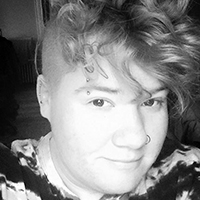 Shalen Lowell is an author, blogger, and poet hailing from Boston, Massachusetts. As a trans author, Shalen specializes in fiction which represents the intersection of fantasy and postmodern genres and queer literature. Shalen currently holds a B.A. in English Literature and Environmental Science, and their work often focuses on the crises of environmental degradation as figured through fantasy media. Their work is also featured in Aether and Ichor.
Shalen Lowell is an author, blogger, and poet hailing from Boston, Massachusetts. As a trans author, Shalen specializes in fiction which represents the intersection of fantasy and postmodern genres and queer literature. Shalen currently holds a B.A. in English Literature and Environmental Science, and their work often focuses on the crises of environmental degradation as figured through fantasy media. Their work is also featured in Aether and Ichor.
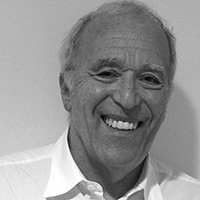 Anthony J. Mohr’s work has appeared in, among other places, Common Ground Review, Compose Journal, DIAGRAM, Eclectica, Front Porch Journal, The MacGuffin, Prick of the Spindle, Word Riot, and ZYZZYVA. He has been anthologized in California Prose Directory (2013) and is upcoming in Golden State 2017. His work has received four Pushcart Prize nominations. He is a reader for Hippocampus Magazine and an associate editor of Fifth Wednesday Journal. Once upon a time, he was a member of the LA Connection, an improv theater group.
Anthony J. Mohr’s work has appeared in, among other places, Common Ground Review, Compose Journal, DIAGRAM, Eclectica, Front Porch Journal, The MacGuffin, Prick of the Spindle, Word Riot, and ZYZZYVA. He has been anthologized in California Prose Directory (2013) and is upcoming in Golden State 2017. His work has received four Pushcart Prize nominations. He is a reader for Hippocampus Magazine and an associate editor of Fifth Wednesday Journal. Once upon a time, he was a member of the LA Connection, an improv theater group.
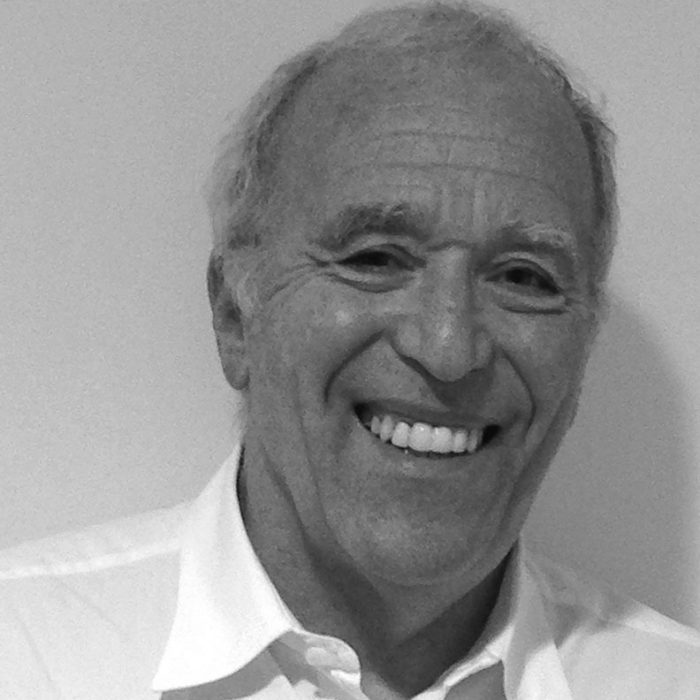

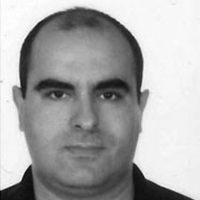 TS Hidalgo (44) holds a BBA (Universidad Autónoma de Madrid), a MBA (IE Business School), a MA in Creative Writing (Hotel Kafka) and a Certificate in Management and the Arts (New York University). His works have been published in magazines in the USA, Canada, UK, Germany, Spain, South Africa, Botswana, Nigeria, India and Australia, and he has been the winner of prizes like the Criaturas feroces (Editorial Destino) in short story and a finalist at Festival Eñe in the novel category. He has currently developed his career in finance and stock-market.
TS Hidalgo (44) holds a BBA (Universidad Autónoma de Madrid), a MBA (IE Business School), a MA in Creative Writing (Hotel Kafka) and a Certificate in Management and the Arts (New York University). His works have been published in magazines in the USA, Canada, UK, Germany, Spain, South Africa, Botswana, Nigeria, India and Australia, and he has been the winner of prizes like the Criaturas feroces (Editorial Destino) in short story and a finalist at Festival Eñe in the novel category. He has currently developed his career in finance and stock-market.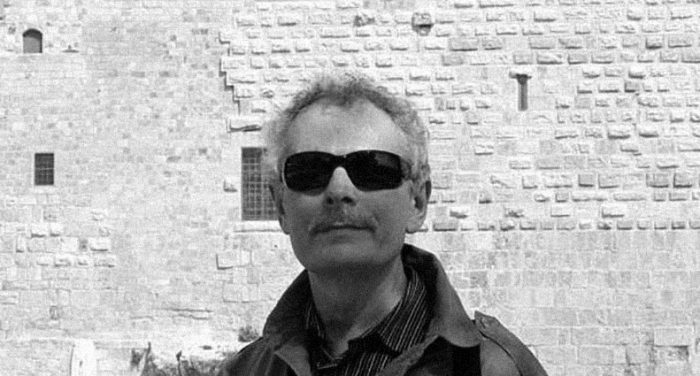
 Mark Budman was born in the former Soviet Union. His writing appeared in Five Points, PEN, American Scholar, Huffington Post, World Literature Today, Daily Science Fiction, Mississippi Review, Virginia Quarterly, The London Magazine (UK), McSweeney’s, Sonora Review, Another Chicago, Sou’wester, Southeast Review, Mid-American Review, Painted Bride Quarterly, Short Fiction (UK), and elsewhere. He is the publisher of the flash fiction magazine Vestal Review. His novel My Life at First Try was published by Counterpoint Press. He co-edited flash fiction anthologies from Ooligan Press and Persea Books/Norton.
Mark Budman was born in the former Soviet Union. His writing appeared in Five Points, PEN, American Scholar, Huffington Post, World Literature Today, Daily Science Fiction, Mississippi Review, Virginia Quarterly, The London Magazine (UK), McSweeney’s, Sonora Review, Another Chicago, Sou’wester, Southeast Review, Mid-American Review, Painted Bride Quarterly, Short Fiction (UK), and elsewhere. He is the publisher of the flash fiction magazine Vestal Review. His novel My Life at First Try was published by Counterpoint Press. He co-edited flash fiction anthologies from Ooligan Press and Persea Books/Norton.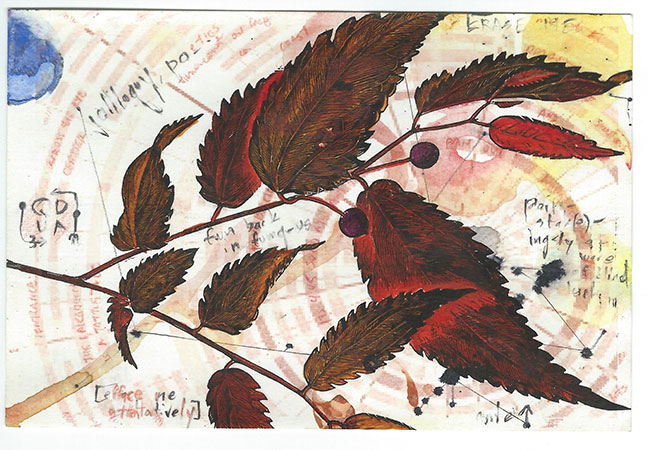
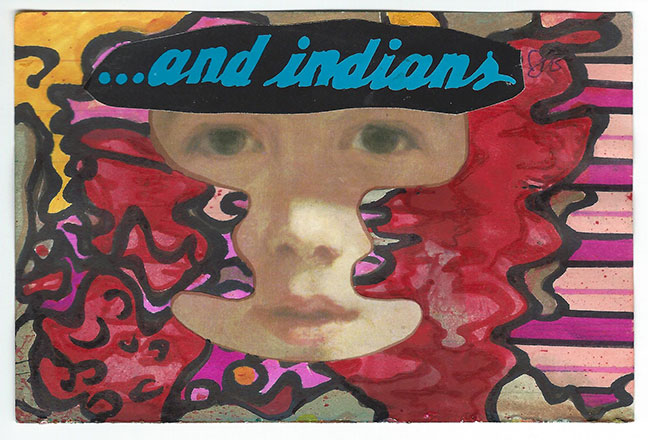
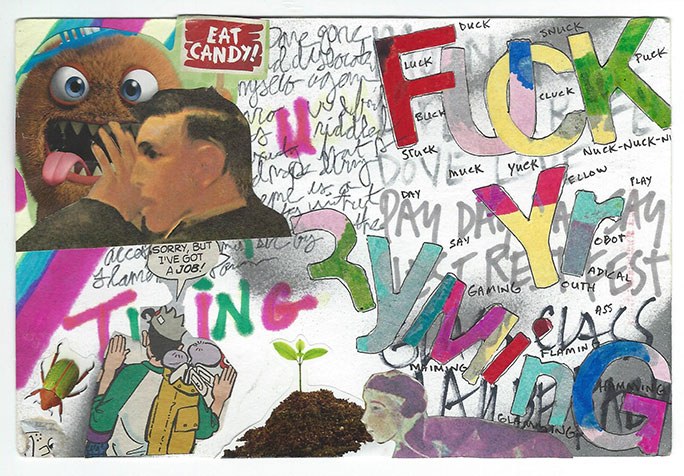
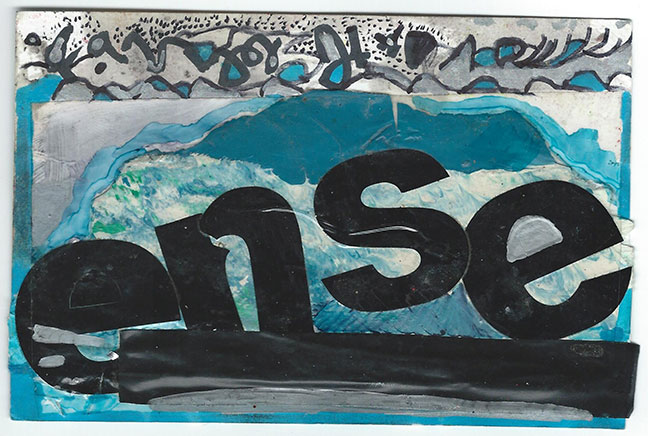
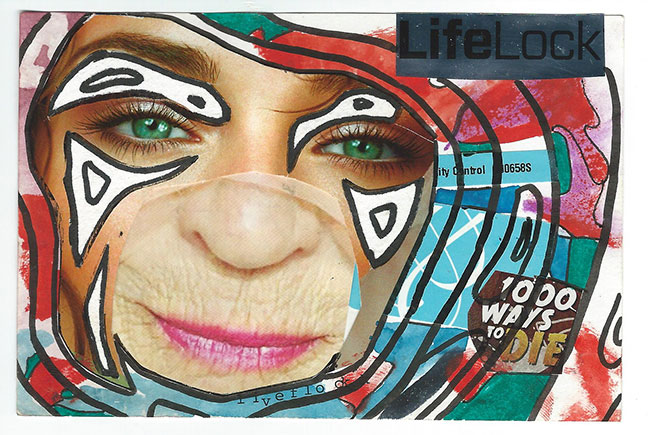

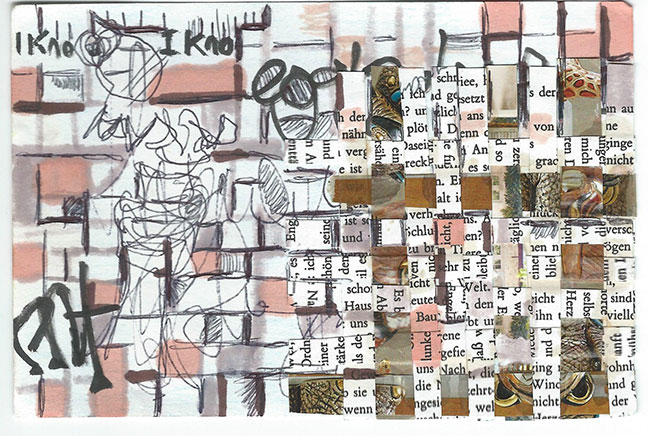
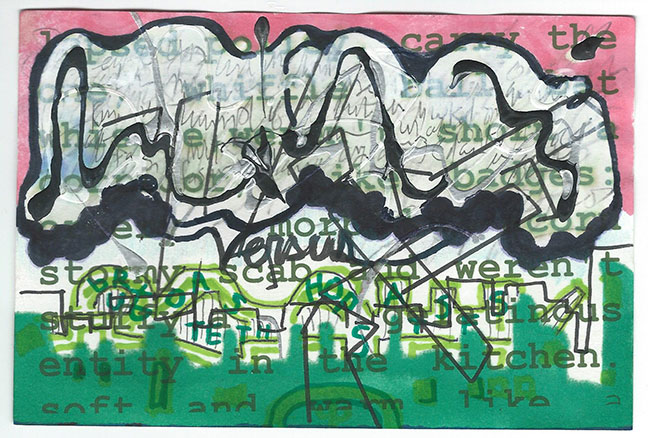
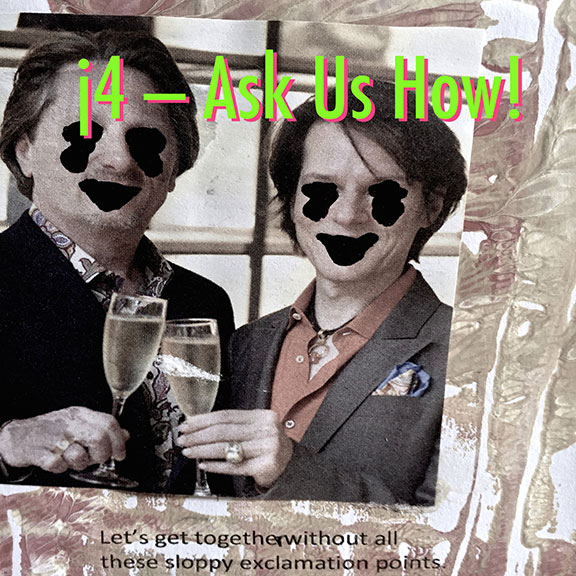
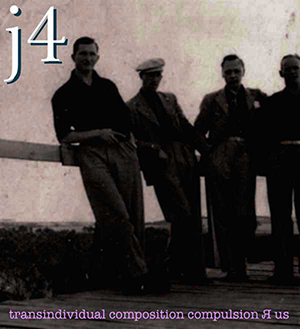 j4 is a collective of four persons, all given names beginning with j, who are compelled to explore transindividual composition.
j4 is a collective of four persons, all given names beginning with j, who are compelled to explore transindividual composition. Mona Leigh Rose lives and writes in Santa Barbara, California. Her stories “You Be Frodo” and “Peace” have appeared in Luna Review. She is infatuated with short fiction, the shorter the better.
Mona Leigh Rose lives and writes in Santa Barbara, California. Her stories “You Be Frodo” and “Peace” have appeared in Luna Review. She is infatuated with short fiction, the shorter the better.



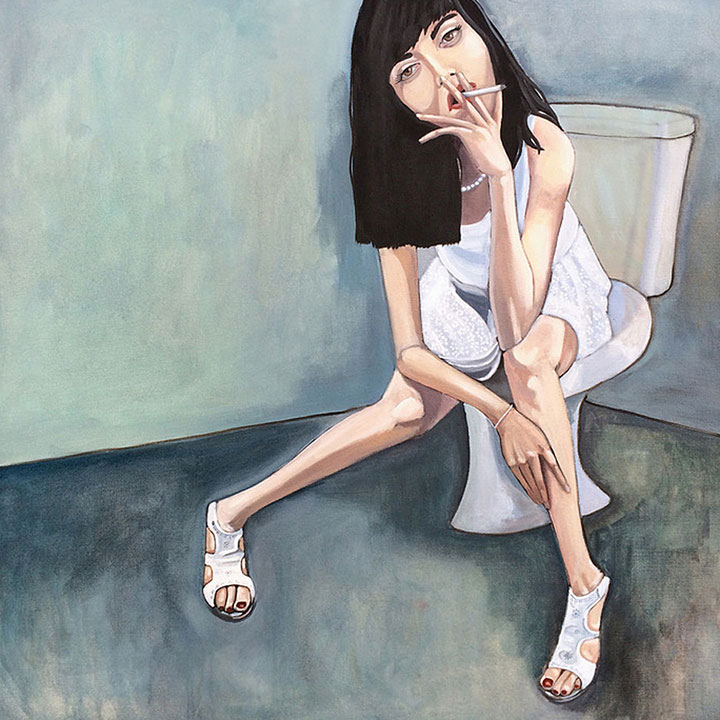




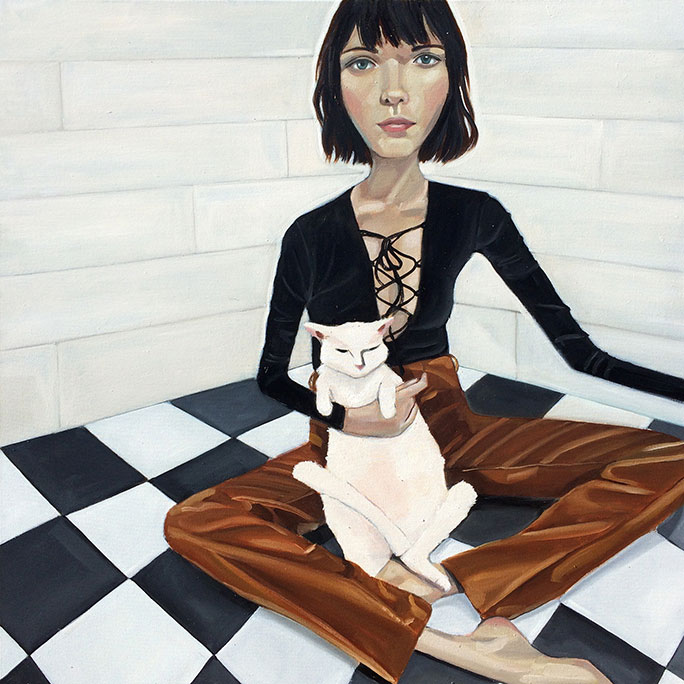
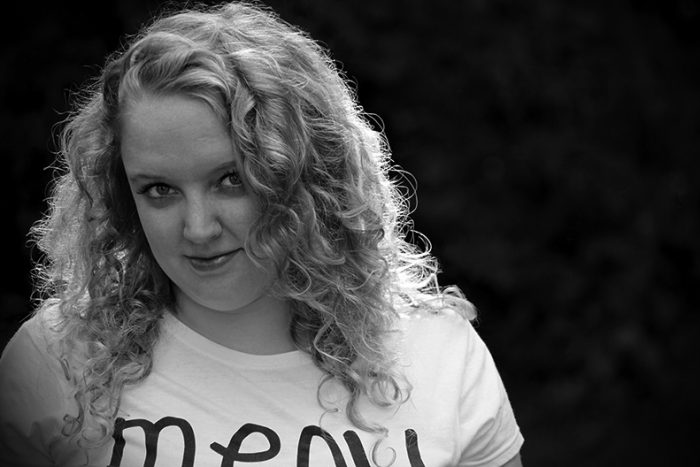
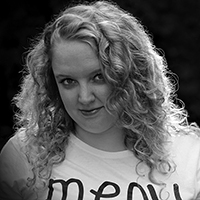 Katie J. Schwartz was raised in a small Midwestern town and now lives in another, frightfully similar, small Midwestern town. She has a Master’s degree in Professional Writing. Her creative works have appeared in Journey Literary Magazine, Adanna Literary Journal, and Black Fox Literary Magazine. Like many writers, she also has a blog: katiejschwartz.wordpress.com. Author photo credit to Bryan Schilligo.
Katie J. Schwartz was raised in a small Midwestern town and now lives in another, frightfully similar, small Midwestern town. She has a Master’s degree in Professional Writing. Her creative works have appeared in Journey Literary Magazine, Adanna Literary Journal, and Black Fox Literary Magazine. Like many writers, she also has a blog: katiejschwartz.wordpress.com. Author photo credit to Bryan Schilligo.
 Natalie Crick has found delight in writing all of her life and first began writing when she was a very young girl. Her poetry is influenced by melancholic confessional Women’s poetry. Her poetry has been published in a range of journals and magazines including Cannons Mouth, Cyphers, Ariadne’s Thread, Carillon and National Poetry Anthology 2013.
Natalie Crick has found delight in writing all of her life and first began writing when she was a very young girl. Her poetry is influenced by melancholic confessional Women’s poetry. Her poetry has been published in a range of journals and magazines including Cannons Mouth, Cyphers, Ariadne’s Thread, Carillon and National Poetry Anthology 2013.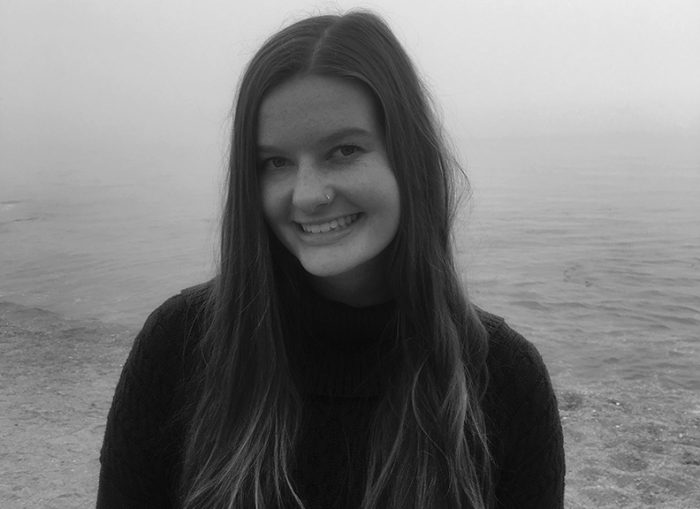
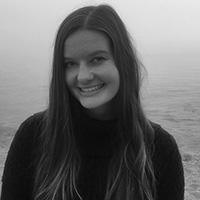 Emma Fuhs spent her childhood on the central coast of California and now attends the University of California, Davis, where she is majoring in English. She aspires to be a novelist and is probably eating a bowl of Cinnamon Toast Crunch right now.
Emma Fuhs spent her childhood on the central coast of California and now attends the University of California, Davis, where she is majoring in English. She aspires to be a novelist and is probably eating a bowl of Cinnamon Toast Crunch right now.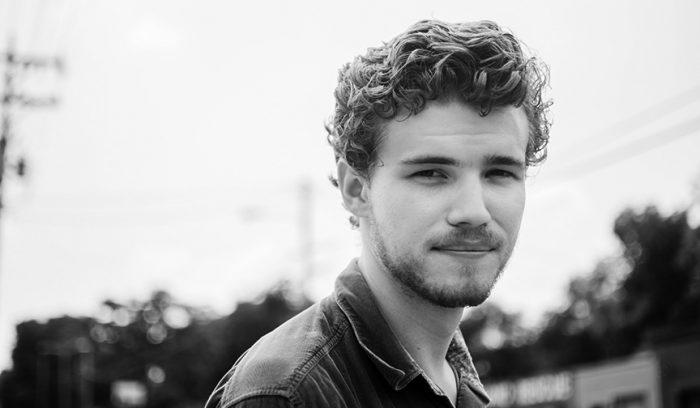
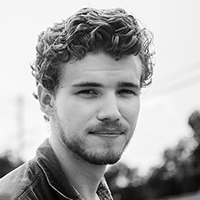 Dustin Lowman is a writer residing in Nashville, TN. He is a prolific composer of poetry, songs, fiction, and nonfiction. His poems have previously appeared in Every Day Poems, Uut Poetry, and Five 2 One. He has self-released 2 albums of original material, Folk Songs (2015) and Thunder I: Calamitous Foe (2016), available in all digital marketplaces.
Dustin Lowman is a writer residing in Nashville, TN. He is a prolific composer of poetry, songs, fiction, and nonfiction. His poems have previously appeared in Every Day Poems, Uut Poetry, and Five 2 One. He has self-released 2 albums of original material, Folk Songs (2015) and Thunder I: Calamitous Foe (2016), available in all digital marketplaces.









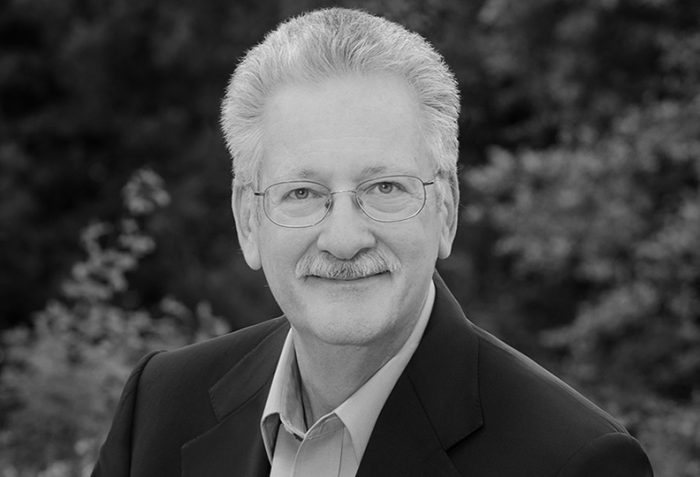
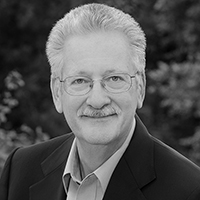 Joe Giordano’s stories have appeared in more than ninety magazines including Bartleby Snopes, The Saturday Evening Post, decomP, The Summerset Review, and Shenandoah. His novel, Birds of Passage, An Italian Immigrant Coming of Age Story, was published by Harvard Square Editions October 2015. His second novel, Appointment with ISIL, an Anthony Provati Thriller will be published by HSE in May 2017. Read the first chapters and sign up for his blog at
Joe Giordano’s stories have appeared in more than ninety magazines including Bartleby Snopes, The Saturday Evening Post, decomP, The Summerset Review, and Shenandoah. His novel, Birds of Passage, An Italian Immigrant Coming of Age Story, was published by Harvard Square Editions October 2015. His second novel, Appointment with ISIL, an Anthony Provati Thriller will be published by HSE in May 2017. Read the first chapters and sign up for his blog at 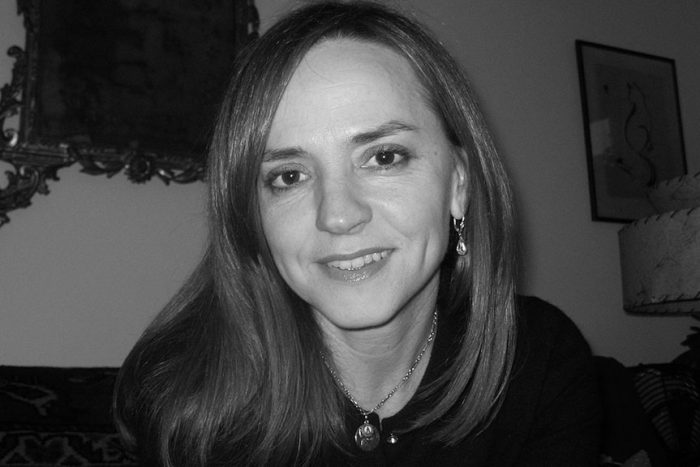
 Mira Martin-Parker earned an MFA in creative writing at San Francisco State University. Her work has appeared in various publications, including the Istanbul Literary Review, North Dakota Quarterly, Mythium, and Zyzzyva. Her collection of short stories, The Carpet Merchant’s Daughter, won the 2013 Five [Quarterly] e-chapbook competition.
Mira Martin-Parker earned an MFA in creative writing at San Francisco State University. Her work has appeared in various publications, including the Istanbul Literary Review, North Dakota Quarterly, Mythium, and Zyzzyva. Her collection of short stories, The Carpet Merchant’s Daughter, won the 2013 Five [Quarterly] e-chapbook competition.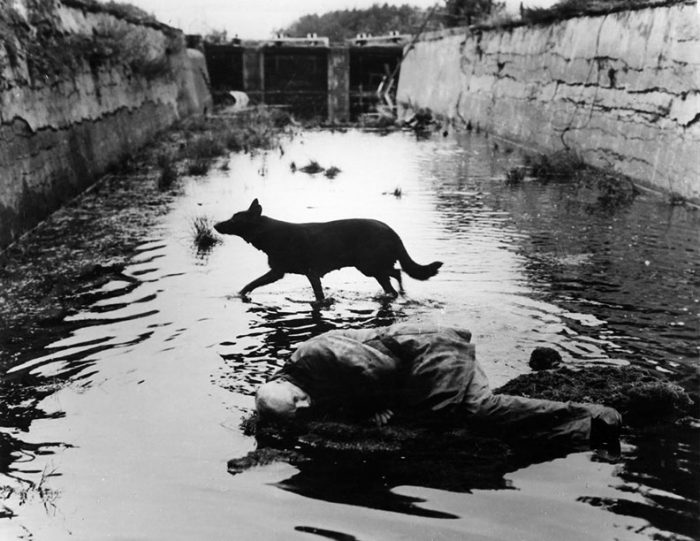
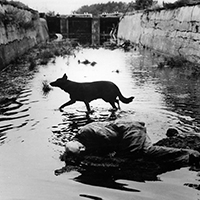 Christopher Branson was shortlisted for the 2016 Impress Prize for New Writers and has recently been published in The Ham. He is close to completing a comic novel about a young man trying to recover from a profound love affair that never happened. Prior to focusing on fiction he wrote a doctoral thesis on Nietzsche. He lives in London, England. @tarkovskysdog
Christopher Branson was shortlisted for the 2016 Impress Prize for New Writers and has recently been published in The Ham. He is close to completing a comic novel about a young man trying to recover from a profound love affair that never happened. Prior to focusing on fiction he wrote a doctoral thesis on Nietzsche. He lives in London, England. @tarkovskysdog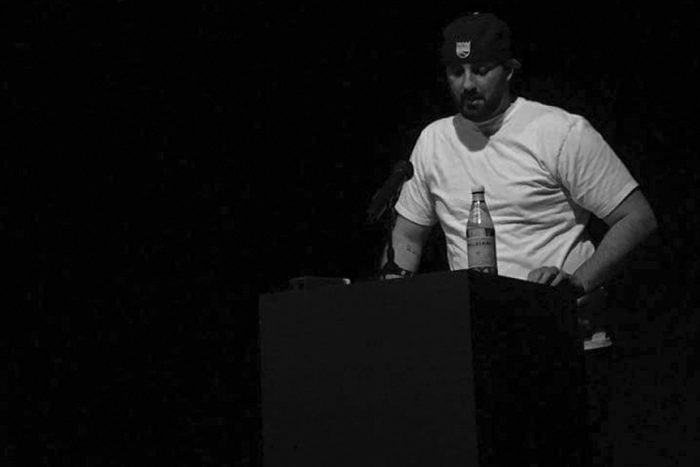
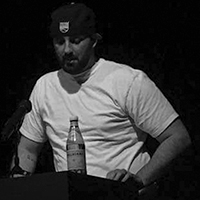 Tamer Said Mostafa is a Stockton, California, native whose work has appeared in various journals and magazines such as Confrontation, Triggerfish Critical Review, Mobius: The Journal of Social Change, and Phantom Kangaroo, among others. As an Arab-American Muslim living in Sacramento, he meditates on life with the reinforcement of family and the music of Bone Thugs-n-Harmony.
Tamer Said Mostafa is a Stockton, California, native whose work has appeared in various journals and magazines such as Confrontation, Triggerfish Critical Review, Mobius: The Journal of Social Change, and Phantom Kangaroo, among others. As an Arab-American Muslim living in Sacramento, he meditates on life with the reinforcement of family and the music of Bone Thugs-n-Harmony.
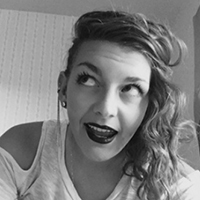 Noelle will graduate in the spring of 2017 with a B.A. in Writing and English from Indiana Wesleyan University. She believes in writing as a catharsis for the grieving and healing. She hopes to work for a publishing house or in the entertainment industry writing for SNL or Jimmy Fallon. Her work can be found in Indiana Wesleyan’s literary magazine Caesura. This is her first piece published in a real literary journal.
Noelle will graduate in the spring of 2017 with a B.A. in Writing and English from Indiana Wesleyan University. She believes in writing as a catharsis for the grieving and healing. She hopes to work for a publishing house or in the entertainment industry writing for SNL or Jimmy Fallon. Her work can be found in Indiana Wesleyan’s literary magazine Caesura. This is her first piece published in a real literary journal.
 Melissa Watt holds an MFA from Emerson College. Her work is featured or forthcoming in Black Heart Magazine, Poetry Quarterly, Ohio Edit, Lunch Ticket, Visitant, Cheap Pop and elsewhere.
Melissa Watt holds an MFA from Emerson College. Her work is featured or forthcoming in Black Heart Magazine, Poetry Quarterly, Ohio Edit, Lunch Ticket, Visitant, Cheap Pop and elsewhere.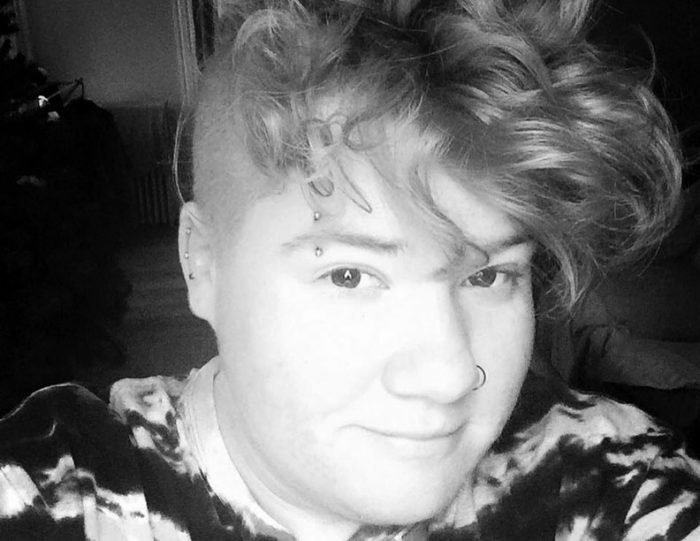
 Shalen Lowell is an author, blogger, and poet hailing from Boston, Massachusetts. As a trans author, Shalen specializes in fiction which represents the intersection of fantasy and postmodern genres and queer literature. Shalen currently holds a B.A. in English Literature and Environmental Science, and their work often focuses on the crises of environmental degradation as figured through fantasy media. Their work is also featured in Aether and Ichor.
Shalen Lowell is an author, blogger, and poet hailing from Boston, Massachusetts. As a trans author, Shalen specializes in fiction which represents the intersection of fantasy and postmodern genres and queer literature. Shalen currently holds a B.A. in English Literature and Environmental Science, and their work often focuses on the crises of environmental degradation as figured through fantasy media. Their work is also featured in Aether and Ichor.

 Lynne Blumberg has written for various national and local publications about topics in health, religion, education, and urban living. She lives in Philadelphia, and when not writing, teaches English as a Second Language at the Community College of Philadelphia.
Lynne Blumberg has written for various national and local publications about topics in health, religion, education, and urban living. She lives in Philadelphia, and when not writing, teaches English as a Second Language at the Community College of Philadelphia.











